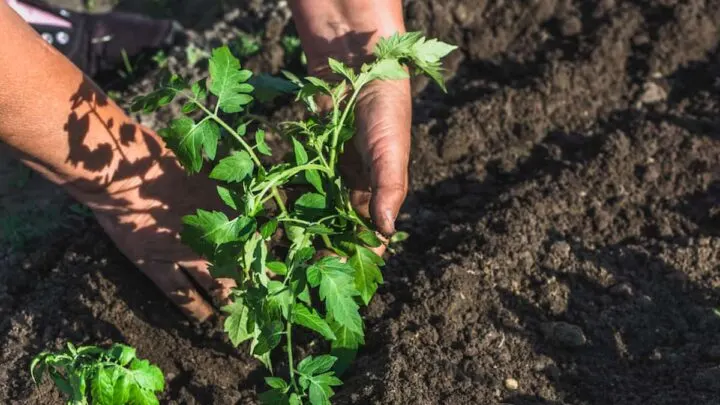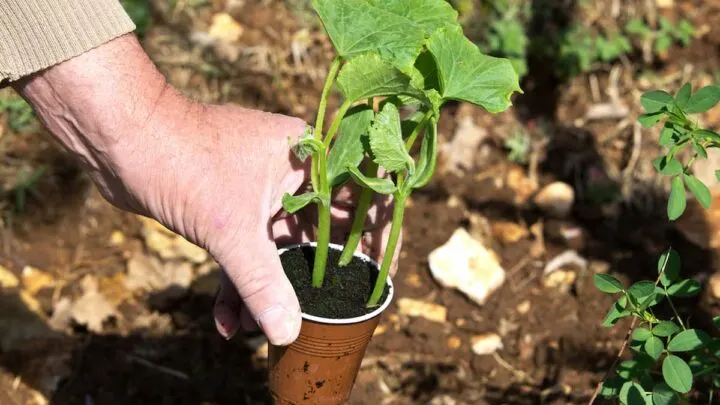You may have heard baking soda being used in the garden as a remedy for plant issues. Before we get into how baking soda can be helpful and harmful to tomato plants, let’s talk about baking soda itself.
Baking soda has only one ingredient: sodium bicarbonate. Sodium bicarbonate, in short, is a type of salt that is attached to other chemical compounds. It is naturally occurring, but the baking soda we buy was most likely made by mining a mineral called Trona, then processed into baking soda.
While baking soda and baking powder are used in the kitchen in place of each other, they are not the same thing. Do not use baking powder in place of baking soda in the garden. Now that we’ve gotten through the baking soda backgrounds, let’s explore why baking soda is used around tomato plants.

Uses For Baking Soda Around Tomato Plants
Fungicide – A fungicide is a substance that kills or inhibits the growth of fungi. Natural fungicides can be made at home using ingredients like baking soda. The most common issues baking soda fungicides are used for in tomato plants are to treat powdery mildew, blight, and leaf spot. The USDA recommends using the following recipe to make home baking soda fungicide for tomatoes.
In a gallon of water, add a heaping tablespoon of baking soda, one teaspoon of vegetable oil, and a dash of mild soap, for example, dish soap.
The soap helps the solution adhere to the plant. Pour the solution into a spray bottle for easier use, and spray the tomato leaves and stems with the solution. In this case, baking soda fungicide can help prevent blight, leaf spots, and powdery mildew. Apply with caution once every one to two weeks.
It’s important to note that studies have shown that baking soda is effective in reducing fungal spores and preventing fungal disease. Still, there were fewer positive results when it came to treating an already existing disease. Baking soda cannot be used to treat all garden or tomato plant diseases.
Pesticide – A Pesticide is a substance that kills pests. They work by various mechanisms. Some pesticides kill pests on contact. Others need to be ingested by the pest first. Baking soda can be used in several ways to treat pest issues. It can be sprinkled around the plant for pests like snails and slugs.

Its kills on contact because of the sodium. Regular table salt has the same effect. Baking soda as a liquid solution can be sprayed onto plant foliage to kill insects like spider mites and aphids. Baking soda does not kill all pests that enjoy tomato plants.
Weedkiller – The exact reason why baking soda kills weeds isn’t entirely clear. Whether it is by causing root damage or burning foliage, some gardeners have had some success with sprinkling baking soda on unwanted plants. The best way to kill weeds around tomato plants is to pull them out.
Can Baking Soda Harm Tomato Plants?
Yes, overusing baking soda can have the opposite effects and cause harm to tomato plants. Baking soda is still a salt and applying too much, or when used too often, can burn the plant foliage, stems, and roots. It can also burn foliage when applied during hot weather and in direct sunlight.
Soil and water naturally contain salts. Nutrients contain small amounts of sodium as well. With so many sources, tomato plants don’t need any more added sodium. Baking soda can cause sodium amounts in the soil to increase to toxic levels. Excess sodium in the soil can impair plant ability to take up nutrients and slow or impair plant growth and reproduction.

There are several environmental concerns about using baking soda in the garden.
The first is that baking soda can accumulate in the soil, changing the balance of soil nutrients. It can also negatively affect soil texture. The runoff can also affect neighboring plants. Another concern is that water runoff containing high amounts of baking soda can get into drain systems and end up in rivers and lakes.
Tips for applying baking soda in the garden.
- Test your solution – Apply baking soda solution to a small portion of the plant to test its effects before spraying liberally on the plant.
- Use moderately – Don’t overuse baking soda by applying heavily just because it is from a natural source or isn’t a chemical.
- Don’t apply during high temperatures – High heat and direct sunlight can cause the baking soda to burn tomato plants which are already sensitive.
- Protect yourself – Be careful of baking soda coming into contact with the skin during use. Baking soda irritates both the skin and eyes. Wash tomatoes before eating to avoid consuming ingredients added to baking soda solutions.
Baking Soda Myths
Baking soda sweetens tomatoes – The theory that baking soda decreases soil acidity, making it more alkaline, thereby causing tomatoes to be sweeter, is not valid. First, the pH of the soil cannot be known without proper soil testing, so applying baking soda into untested soil is counterproductive.
Secondly, tomato plants like slightly acidic soil! Alkaline soils can slow tomato plant growth. Some tomato varieties are just naturally acidic, so tomato flavor may be due to the variety being grown and not because of any issues with the plant or soil.
Baking soda deodorizes compost – Sprinkling baking soda into or around compost reduces compost odors. The amount of baking soda needed to keep a compost pile smell free would be phenomenal. Compost is made from constantly decaying food, and odors are unavoidable. Covering compost piles with the material is more effective at keeping odors down than baking soda.
Baking soda can be used as fertilizer – This is untrue. Baking Soda is only sodium. It contains no other minerals or nutrients. It cannot give to plants what isn’t there.
Baking Soda can test the pH of the soil – The only way to definitively know the pH of the soil is to have the soil tested using proper lab testing methods. A good soil test will guide the optimum pH levels for tomato plants and how to amend soil pH if it isn’t ideal.
Final Thoughts
Always do a little research before trying out home remedies in the garden. It can sometimes be a mistake that cannot be undone. If you are concerned about using chemical pesticides, fungicides, and weedkillers, natural and organic alternatives have been tested for safety and effectiveness.
While baking soda does have some positive effects when used on and around tomato plants, it is not a cure-all and, like anything else, should be used responsibly and with caution.

Hi there, my name is Allie and welcome to my blog; GareningWithAllie!
Much of what you see written here is just our personal experiences with gardening. Along with the content I write here, there is also a unique collection of gardening topics covered by some of our close friends. I hope you find everything you read here to be helpful, informative, and something that can make your gardening journey the most lovely experience ever! With that said, Happy Gardening!
